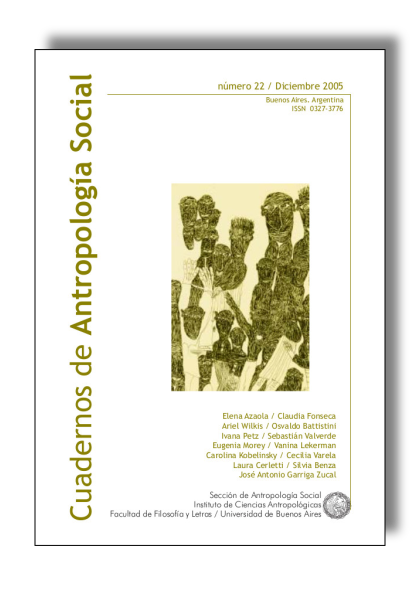¿Qué significa estar seguro? De delitos, miedos e inseguridades entre los adultos mayores
Abstract
Ever since the implementation of the victimization surveys (VS), the victimization literature acknowledges the paradox whereby the social groups less vulnerable to crime (women and the elderly, for the most part) exhibit high levels of fear and, on the contrary, those most susceptible to crime (youngsters and males) manifest lower levels of fear. The goal of this paper is to explore a range of representations about the “security” issue held by the elderly with a qualitative strategy. On the other hand, on the assumption that fear of crime cannot be solely linked to the actual object through which this is manifested, I examine new analytical dimensions accounting for “fear of crime” above and beyond the criminality issue within this age class.Downloads

Esta obra está bajo una Licencia Creative Commons Atribución 4.0 Internacional
Cuadernos de Antropología Social sostiene su compromiso con las políticas de Acceso Abierto a la información científica, al considerar que tanto las publicaciones científicas como las investigaciones financiadas con fondos públicos deben circular en Internet en forma libre, gratuita y sin restricciones.
Los contenidos y opiniones expresadas en los artículos publicados son de entera responsabilidad de sus autores.
Los autores/as que publiquen en esta revista aceptan las siguientes condiciones:
- Los autores/as conservan los derechos de autor y ceden a la revista el derecho de la primera publicación, bajo la licencia de atribución de Creative Commons, que permite a terceros utilizar lo publicado siempre que mencionen la autoría del trabajo y a la primera publicación en esta revista.
- Los autores/as pueden realizar otros acuerdos contractuales independientes y adicionales para la distribución no exclusiva de la versión del artículo publicado en esta revista (p. ej., incluirlo en un repositorio institucional o publicarlo en un libro) siempre que indiquen claramente que el trabajo se publicó por primera vez en esta revista.















